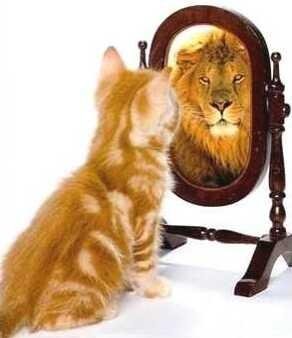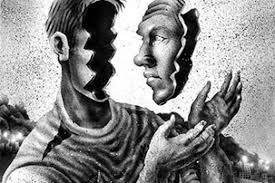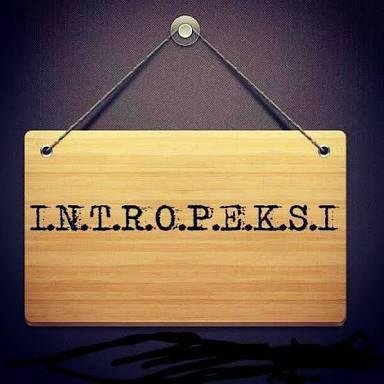Self-Introspection, Forgotten Mistake # Introspection or Introspection, which True is?

In the journey of life in the world, of course a Muslim will not be separated from mistakes and sins as a result of lust indulgence. In addition, the fruit of thought produced by humans, who boasted by the owner, not infrequently who disregard the truth, not the least that is contrary to the teachings set by God and His apostle. Therefore, as time passed by God to man in the world, it should be used to introspect all the behaviors and thoughts that he has, thus encouraging him to self-correct in a better direction.
Introspection, Door to Self-Correction
In the book of his Sahih, Bukhari's imam opens one of the chapters of ash-Shaum with the words of Abu az-Zinad,
إن السنن ووجوه الحق لتأتي كثيرا على خلاف الرأي
"Surely the majority of sunna and truth are contrary to personal opinion" [HR. Bukhari].
It is true what he said, how often people are reluctant to accept the truth because it is against personal opinions and tendencies. Is not the monotheistic propagation offered by the prophet to the idolaters, rejected because it is contrary to their personal desires, especially prominent figures among the polytheists?
Not infrequently a person is not able to survive from the passions and free from the mistake of opinion for insistence on believing something and not accept correction. This is certainly different from the case of a misguided mujtahid in berijtihad. When the Shari'ah explains that a misguided Mujtahid is rewarded for his ijtihad, this does not mean to support him to turn a blind eye to the error of ijtihad and to hold his opinion if it has been manifestly wrong. How many jurisprudence experts then reconcile after reviewing their fatwas and see that the truth rests on the opinions of others.
We can take a lesson from the angels' rejection of the people who are about to come to al-Haudh (lake of Rasulullah on the Day of Resurrection). They can not go to al-Haudh because in the past, they are among those who insist on mistakes, mistakes and apostasy, when the truth is clear in their presence. This is shown in the hadith, when the angels give the prophet a reason,
إنهم قد بدلوا بعدك, ولم يزالوا يرجعون على أعقابهم, فأقول: ألا سحقا, سحقا
"They have changed (your teaching) after you" then I said: "Stay away ... get away there (then)" [Saheeh. HR. Ibn Majah].
We can see that the Prophet sallallaahu 'alaihi wa sallam mendo'akan accidents to them, because they are reluctant to introspection, reluctant to make corrections by accepting the truth that is in sight. Therefore, self-evaluation is an intermediary for muhasabah an-nafs, while self-correction is a result whose influence is characterized by reconciliation of immorality and error in an opinion and deed.
Means of Self-Evaluation
Among the tools that can help a person to self-evaluate are as follows:
First, do not shut out the advice of others
One can be helped to evaluate oneself by deliberating with colleagues with the intention to seek the truth. Imâm Bukhârî issued a narration narrating Umar's suggestion to Abu Bakr al-radi anhuma to collect the Qur'an. At that time Abu Bakr rejected the proposal, but Umar continued to urge him and said that it was good. In the end Abu Bakr also accepted and said,
,
فلم يزل عمر يراجعني فيه حتى شرح الله لذلك صدري, ورأيت الذي رأى عمر
"Umar persuaded me constantly to evaluate my opinion in the matter until Allah stretched my heart and I thought as Umar said" [HR. Bukhari].
Abu Bakr did not insist on his opinion when there was a better proposal. And his higher position does not preclude receiving truth from those who have different opinions.
Second, befriend with a good friend
One means for a Muslim to stay on the right path is to ask a righteous companion to advise and remind us of our mistakes, to ask his input on the best solution to a problem, especially when the other person no longer cares to remind each other. Is not forever our opinion and thoughts are not more correct and directed than the Prophet sallallaahu 'alaihi wa sallam, when he said,
إنما أنا بشر مثلكم, أنسى كما تنسون, فإذا نسيت فذكروني
"I am only a human like you. I forgot as you forgot. Therefore, remind me when I forget "[HR. Bukhari].
As cultures counsel and remind each other in the behavior of the believers, it is as if they are a mirror to ourselves that will encourage us to be consistent. Therefore, in determining the right path and opinion, you must be friends with a righteous man. You do not look to maddahin (the sycophant) who will not remind you of his brother's mistake.
إذا أراد الله بالأمير خيرا جعل له وزير صدق, إن نسي ذكره, وإن ذكر أعانه
"If Allah wills the good of a leader, then Allah will give him an honest companion who will remind him if he is negligent and will help if he remembers" [Saheeh. HR. Abu Dawud].
A real example of this is mentioned in the story of al-Hur bin Qais, the believer of Umar ibn al-Khattab radhiallahu anhu. At that time, Umar was furious and was about to beat Uyainah bin Husn for acting insolent to him, so al-Hur said to Umar,
يا أمير المؤمنين, إن الله تعالى قال لنبيه صلى الله عليه وسلم: {خذ العفو وأمر بالعرف وأعرض عن الجاهلين} [الأعراف: 199], وإن هذا من الجاهلين, «والله ما جاوزها عمر حين تلاها عليه, وكان وقافا عند كتاب الله»
"O amir al-mu'minin, verily Allah ta'ala says to His prophet," Give forgiveness, command the good and turn away from the fool. "This man is indeed a fool. The narrator of this hadith says, "By Allah Umar is not opposed to that verse when it is recited because he is the one who always submits to the Qur'an." [HR. Bukhari].
How much injustice can be eliminated and how many wrong actions can be corrected when a righteous partner performs his role.
Third, aloof to do muhasabah
One of the most useful forms of self-evaluation is to be alone to do muhasabah and correct the various practices that have been done.
Narrated from Umar bin al-Khattab, he said,
حاسبوا أنفسكم قبل أن تحاسبوا, وتزينوا للعرض الأكبر
"Correct yourself before you are reckoned and decorated (with good deeds) for a great performance (on the Day of Resurrection)" [HR. Tirmidhi].
It is narrated from Maimun bin Mihran, he said,
لا يكون العبد تقيا حتى يحاسب نفسه كما يحاسب شريكه
"The servant is not said to be cautious until he corrects himself as he corrects his colleague" [HR. Tirmidhi].
If this is done, undoubtedly the person who executes it will be lucky. It is not a disgrace to reconcile to the truth, because the real calamity is when constantly doing evil.
The Surgical Method
Introspection has several benefits, namely:
First, calamity lifted up and recycled
In the above mentioned atsar Umar mentioned that the cause of the lifting of the calamity and the relief of reckoning on the Day of Resurrection is when a person always bermuhasabah. Umar radhiallahu anhu said,
وإنما يخف الحساب يوم القيامة على من حاسب نفسه في الدنيا
"Verily the reckoning on the Day of Resurrection will be light only for those who always menghisab themselves while living in the world." [HR. Tirmidhi].
When the various devastations have been uniformly distributed throughout the whole of life, the way out of this is by returning (referring) to the teachings of religion as the Prophet sallallaahu 'alaihi wa sallam,
إذا تبايعتم بالعينة, وأخذتم أذناب البقر, ورضيتم بالزرع, وتركتم الجهاد, سلط الله عليكم ذلا لا ينزعه حتى ترجعوا إلى دينكم
"If you buy and buy in this way (usury), take the cows (do zhalim), ridha with agriculture (leave the world) and leave jihad (defending religion), Allah will inflict humiliation on you, He will not pull it until you go back to the teachings of religion "
In other narrations, mentioned with lafadz,
حتى يراجعوا دينهم
"Until they correct the practice of their religion" [Saheeh. HR. Abu Dawud].
You can notice that self-correction is the first step in the lifting of calamity and humiliation.
Second, the heart of the field of kindness and the priority of the world
Similarly, correcting the condition of the soul and charity is the cause of the cleansing of the heart to receive goodness and to give priority to the eternal life of the finite (of the world). In a long tradition from Ibn Mas'ud mentioned, "Once upon a time a king who lived before you were in his kingdom and was contemplating. He realizes that his kingdom is impermanent and that which is in it has preoccupied him from worshiping God. Finally, he alienated himself from the kingdom and went to another kingdom, earning fortune from his own sweat. Later, the king of the land knew about him and the news of his piety. So the king went to see him and asked for his advice. The king also said to him, "Your need for worship that you do is also needed by me". Finally, the king descends from his mount and ties it, then follows the man until they both worship Allah azza wa jalla together "[Hasan. HR. Ahmad].
Note, their ability to correct mistakes and the desire to improve themselves after being blinded by power, arises after reflecting on and introspecting the nature of their condition.
Third, improve relationships among human beings
Introspection and self-correction is an opportunity to correct the fractures that occur among humans. Prophet sallallaahu alaihi wa sallam said,
إن أبواب الجنة تفتح يوم الاثنين ويوم الخميس, فيغفر لكل عبد لا يشرك بالله شيئا, إلا رجل بينه وبين أخيه شحناء, فيقال: أنظروهما حتى يصطلحا "مرتين
"Surely the gates of heaven are opened on Mondays and Thursdays, in the second day all the servants are forgiven except those who have enmity with their brothers. So it says, "Punish the forgiveness of these two men until they reconcile" [Sanadnya saheeh. HR. Ahmad].
Do you think that is a moratorium on forgiveness for those who are hostile, because they are reluctant to self-correct to encourage them to make peace?
Fourth, free from the nature of nifak
Often self-evaluating to then correct the practice that has been done is one of the reasons that can distance themselves from the nature of hypocrisy. Ibrahim at-Taimy said,
ما عرضت قولي على عملي إلا خشيت أن أكون مكذبا
"It is not my comparison between my words and my deeds, but I am afraid if I find myself a liar (his remarks disregard his deeds)."
Ibn Abi Malikah also said,
أدركت النبي صلى الله عليه وسلم, كلهم يخاف النفاق
"I met 30 companions of the Prophet sallallaahu alaihi wa sallam, feeling all concerned about the hypocrisy of themselves. None of them says that his faith is like the faith of Gabriel and Mikail. "[HR. Bukhari].
When commenting on the words of Ibn Abi Malikah, Ibn Hajar quotes Ibn Baththal saying,
إنما خافوا لأنهم طالت أعمارهم حتى رأوا من التغير ما لم يعهدوه ولم يقدروا على إنكاره فخافوا أن يكونوا داهنوا بالسكوت
"They are worried because they have a long life until they see things they do not know and can not afford to deny, so they worry if they become a sycophant with silence" [Fath al-Baari 1/111].
In conclusion, a Muslim should admit that he is his place wrong and must keep in mind that it is impossible he is free from mistakes. This confession must be in him, so that he can admit his mistakes so that the door to self-correction is not closed to him. Allah ta'ala says,
إن الله لا يغير ما بقوم حتى يغيروا ما بأنفسهم
"Allah will not change the condition of a people until they change it themselves" (Al-Ra'd 11).
Man is a weak creature, how often he has an attitude and attitude that change. However, how lucky are those who are shaded by religious teachings by evaluating themselves to do the right thing and self-correcting so as to do something that is pleasing to Allah. Truly referring to the truth is the behavior of those who return to God and repent to Him.
Adapted from the article al-Muraja'ah wa at-Tashhih

Month of Ramadan Intropection Month

Time buddy is running so fast, the masasetahun not feel. Just yesterday we do worship month of Ramadan, now stay a few more days that month come back to us. Day turnover and time changes are less noticeable. Just think a day or two, it's been a week. A week passes by the turn of the month. It does not feel like a month goes by. Count has a count already been a year we passed. From Ramadhan last year, get to Ramadan again. The sooner the time passes.
We sometimes forget, that the turn of the day and the journey of this time increasingly decrease our age quota. Increasing years, getting older, getting closer to the door of the grave. In this past year what have we done? What have we done for us, for our parents, for our families, for our religion, for a better tomorrow, an eternal day, an eternal day .. ??
We all must understand that whose name died is certain. Who in this world will not experience death? All will die. King Fir'awn who once claimed to be God, finally died too. In short, when death has arrived, the angel of death comes to fetch, his name dies must arrive despite hiding in the hole ant.
The month of Ramadan that we are ahead of this is the month full of blessings, the moon to gain merit and melt sin. Called as a place to gain merit because every charity of virtue in the month of Ramadan by Allah doubled its reward. Increase infak, alms, help and help the orphans and the poor, as well as other worship, such as remembrance, reciting the Qur'an, praying circumcision and so on as an effort to increase and increase deposits akherat. It means to incriminate the scales of reward in the future.
The month of Ramadan is the month of quality. A precious month. As much as possible what we do is a worthwhile act. The mouth does not speak except words that are useful, meaningful, and valuable. The ears do not listen except the precious ones. The only thing we do must be worth the purpose just because of God ..!
We must also be more persistent to honestly assess ourselves. Persistence to honestly assess yourself will certainly make it easier for us to find the deficiency and then fix it. Persisting in self-improvement is the real essence of trying to improve others. It means we are busy fixing others while we are getting worse in bad.
How can a child diligently study if her parents are lazy to worship. How do students want to study hard if their teachers are even busy SMS-an while teaching. How the people want to live simple if the leaders are just lavish. If we are good and can be role models, no one will follow. MoonRamadhan this year we should use for self introspection. So at the end of Ramadan we came out transformed as a beautiful butterfly from a cocoon. Yaknikepompad Ramadan.

Which is correct and is a standard word? Introspection or introspection?
Some people may question what is true of the two words above. In this paper, we will discuss what is the correct word between introspection or introspection. Knowing the right words is very useful for everyone who wants to use this word in various writing
According to Kamus Besar Bahasa Indonesia (KBBI) the correct word is Introspection (using s), not introspection. The word introsection is not found in KBBI. So if you want to use this word in writing, use the word Introspection.
Which is the standard word is Introspection.
The meaning of introspection according to KBBI is:
Self-review. Self-examination Self-awareness Self-correction. Introspection word drop:
Introspect which means: Conducting or introspecting on self.
Introspect: which has the meaning: the same as introspect.
Examples of the use of the word introspection in the sentence:
We should each introspect first.
Momon and Jojon are asked to examine themselves
Before blaming others, you should first self-introspection.

Going home with Self-Improvement Vehicle
The month of Shawwal is the month of silaturrahmi. One form of business gave birth to silaturrahmi by going home. We know together that a nomad of course vehicles going home both cars, motor vehicles and others in general, before going home to the yard.
So also with ourselves we must always care for ourselves by providing the best service. Among the services through self-introspection or better known as muhasabah. Muhasabah this if necessary every time try to keep a glass self.
Saidina Umar bin Khaththab in mankind has warned us with his saying, "Hisablah you before dihisab, weigh yourself before weighing. Actually introspection for you today is lighter than the later reckoning "(HR Faith Ahmad and Tirmidhi are willingly from Umar bin Khaththab).
A similar statement also came from one of the famous Sufi figures Hasan Al-Bashri once revealed: "A believer is a leader for himself. He relieves himself for God. For reckoning on the Day of Resurrection will be light for those who have recovered themselves in the world. "
The procession of self introspection will be more perfect with the combination of mu'ahadah (remember always our covenant in the spirits of nature with the Almighty Allah SWT). This agreement begins creation by the scholars as the first creed. This incident enshrined in the Qur'an reads: "And remember when your Rabb took the offspring of the sons of Adam from their sulbi, and God took witness against them (saying):" Am I not your Lord? "They replied. "Yes (we are our Lord) we are witnesses. (We do so in order that on the Day of Resurrection you do not say, "We (the People of Adam) are the guilty of this (the unity of God)." (Surat al-A'raf: [17]: 172).
The agreement whether we deny or not is just another person who knows better. Among the other covenants we often make one day a night, five times in prayer reads: "Only unto thee we worship, and unto Thee we ask and seek help." (Surah Al-fatihah: [1]: 5).
We must be able to realize ourselves as abdun (servant). Besides, a question worthy of our question and answered itself is on have we serve in servitude to the khalik and ask for help only to Allah SWT?
As we know that life in this world is a place of planting and doing good deeds. Seeds and plants that we are seedling plus a good care will produce a good harvest in the world to take home time back and forth later. The world as a field for cultivating plants in the afterlife. As mentioned in a hadith even though the status of hadith is still disputed between maudhu 'or not,' The world is a field of the Hereafter '.
Sometimes the essence of going home has also been repositioned quite apprehensive. This kind of atmosphere is caused by the excesses of global cultural influences that confine the soul and heart of the empty Islamic world of spiritual values.
One of these repositions, in which homecoming tradition has become a consumptive arena of fusion in the behavior and behavior of Muslims who are buoyed by a hedonist-consumerist culture. Such global cultural access will eliminate the real essence of going home to strengthen the long-standing emotional bond lost due to a change of mindset and a luxurious lifestyle. It is a glorious worth of homecoming that we are able to realize in this life.
Self @alfa-good
Good post